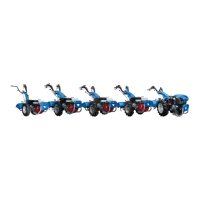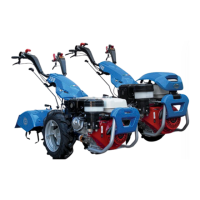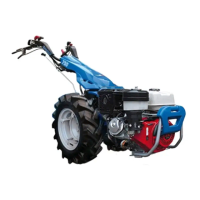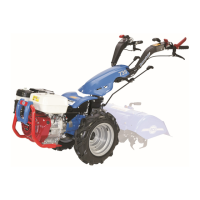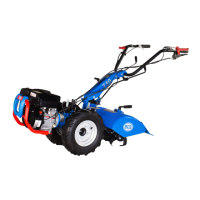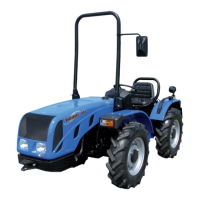Do you have a question about the BCS PowerSafe 710 PS and is the answer not in the manual?
Explains the meaning of safety symbols on the machine and manual.
Outlines important safety warnings for operators, onlookers, children, and pets.
Refers to the specific engine manual for identification and tagging details.
Explains machine marking as shown in Figure A, indicating serial number and model.
Describes the identification label applied to each machine, as shown in Figure B.
Lists and illustrates various safety and control labels found on the machine.
Provides information on engine type, power, and RPM, referencing Table 2.
Details the hydraulic, mechanically-controlled PowerSafe® clutch.
Describes the differential (not on 710PS/728PS models) with conical gears and locking.
Explains the braking system, differentiating between models regarding control and parking brake.
Details the adjustable handlebar for height, lateral position, and 180° orientation.
Describes the oil-bath gearbox with rapid mechanical inversion and hydrostatic option.
Explains the function of the red reverser lever for changing forward/reverse speeds.
Details the quick attachment for PTO, standard on the 750 model with easy locking.
Describes the front-mounted, right-hand rotation PTO with independent gear and motor speed linkage.
Explains the Powersafe® clutch safety function and how to adapt machines for different tools.
Provides dimensional data and maximum weight specifications for various models in a table.
Describes the electric starter system for engines, with specific battery requirements.
Instructions for mounting wheels, noting tread design orientation and tire pressure.
Details how to attach implements directly or via quick hitch to specific tractor models.
Explains how to attach implements to the 750 model using a shank and bushing for standard flange.
Describes the 3-tooth PTO with front engagement, right rotation, and linkage to motor speed.
Instructs to check engine oil level according to the manual and use specified quality and density.
Details how to check gearbox oil level using the plug and specifies the correct oil type.
Guides on filling the fuel tank using a funnel with a mesh filter, emphasizing safety precautions.
Emphasizes proper machine use, prohibits misuse, and stresses keeping safety devices functional.
Lists essential pre-start checks for the engine, including clean grills, oil level, neutral gear, and clean filters.
States the Powersafe® clutch requires minimal maintenance, except for oil and filter changes.
Advises following engine manual for maintenance intervals, checking oil, and using quality oil.
Details gearbox oil filter replacement and level checks, specifying procedures for the first 30 hours and weekly checks.
Specifies oil and filter replacement every 100 working hours or annually, and cleaning the magnetic cap.
Presents the hydraulic system diagram for PowerSafe® and PowerSafe® + EasyDrive® transmissions.
Lists various implements mountable on the tractor and warns against using them for transporting people.
Lists available accessories like bar protections, PTO, and wheel spacers, noting they meet European directives.
Recommends pneumatic wheels for agricultural use due to tread grip and discusses adjustable track options.
Describes cage wheels for hard ground use, providing adherence and preventing slippage.
Highlights Super-Bite wheels for sloping terrain, improving traction and lateral stability.
Explains how to twin wheels using spacers for increased stability.
Details wheel spacers used to widen the track for improved stability on slopes.
Introduces ballast types available for balancing the machine with various implements.
Describes optional weights for the 750 model to balance handlebar weight or increase traction during ploughing.
Highlights the usefulness of the rotary hoe wheel for easier machine transport by lifting the hoe off the ground.
Recommends applying front protection for the cutter bar during transfers or when exposed.
Explains the purpose of side protections for the cutter bar to prevent damage and for safety.
Details the quick hitch system for rapid implement changes, comprising shank and sleeve.
Describes the standard PTO with a 35mm splined shaft for driving various implements.
Explains the 80mm extension for balancing machine and implement weight, with or without ballasts.
Details PTO adaptors for connecting older implements to newer PTO systems or vice-versa.
Provides a checklist of checks for a gasoline engine that fails to start.
Lists checks for a diesel engine that fails to start, including fuel lines and decompressor.
Instructs to check the gear selector if the machine fails to move.
Addresses issues with the rotary hoe causing the machine to jump forward on hard ground.
Describes frequent cutter bar attachment breakage and suggests checking clearances.
Presents data on acoustic pressure, acoustic power, and vibration levels, with safety advice for high noise levels.
Lists the items included in the machine's tool kit.
Outlines the warranty terms and conditions, including limitations for batteries and the PowerSafe® clutch.
Mentions conformity and delivery declarations provided to the buyer, ensuring compliance with European directives.
Describes the buyer's role in subscribing the declaration and keeping a copy for warranty reference.
Lists parts subject to wear and tear that are not covered by warranty, including knives, blades, and teeth.
